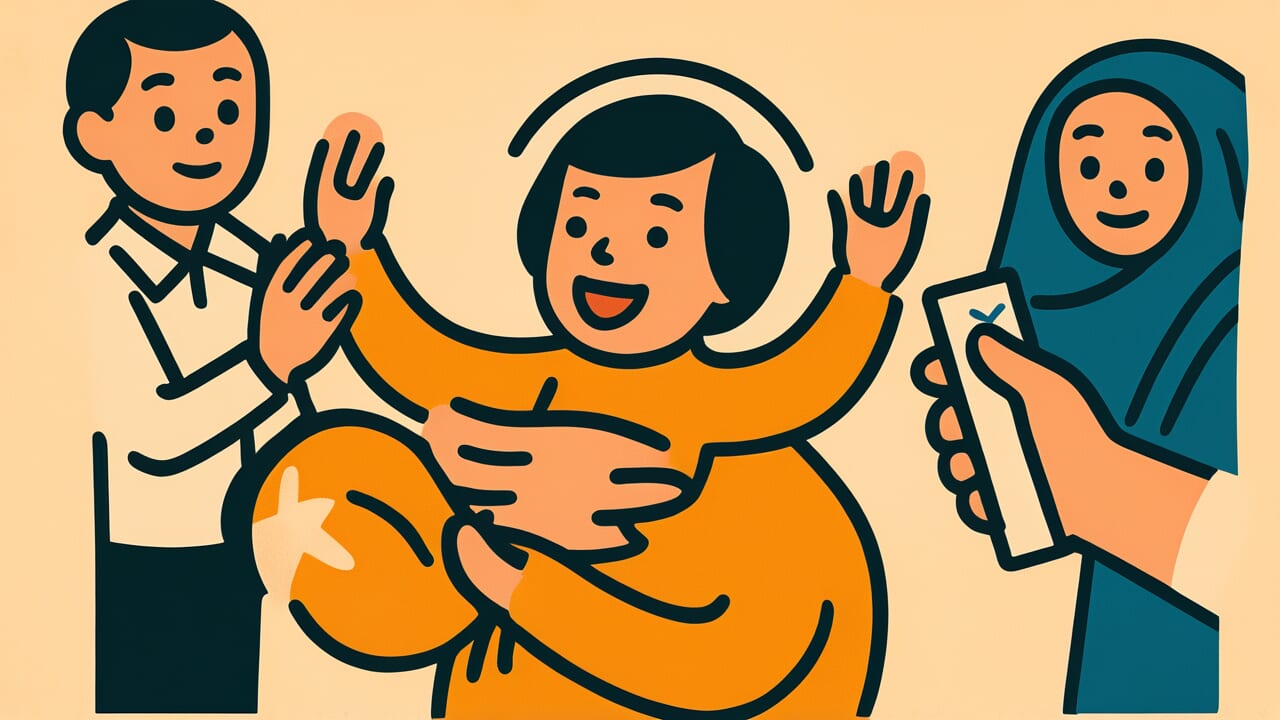How to Read “The child you hold is more precious than the child you bore”
Unda ko yori daita ko
Meaning of “The child you hold is more precious than the child you bore”
This proverb means that raising a child with love matters more than blood ties. Even with a biological parent-child relationship, true bonds don’t form without affection.
On the other hand, even without blood relation, real parent-child relationships develop through daily care, embracing, and nurturing with love.
People often use this saying when discussing adopted or stepchildren. It reminds those worried about lacking blood ties that something more important exists.
It also appears when praising foster parents’ deep love, especially when biological parents neglect their children.
Today, society recognizes many forms of parent-child relationships. These include foster care systems and special adoptions.
This proverb teaches a timeless truth. The essence of family lies in love, not bloodlines.
Origin and Etymology
No clear records exist showing when this proverb first appeared in literature. However, its structure suggests it emerged from common people’s lives during the Edo period or later.
The contrast between “the child you bore” and “the child you hold” creates a striking image. “The child you hold” refers to adopted or stepchildren.
The phrase expresses the importance of daily embracing and nurturing with love, even without blood ties.
Japan has long maintained a culture of adoption. Families adopted children for various reasons – to continue the family line or to become parents when childless.
Against this social backdrop, people realized that biological relationships aren’t the only bonds. This awareness likely gave birth to the proverb.
The saying values “holding” – a daily expression of love – over “bearing” – a biological fact. This emphasis is fascinating.
The words contain deep human understanding. True parent-child relationships form through daily embracing, caring, and heartfelt nurturing.
The proverb values visible accumulation of daily affection over invisible blood ties. It reflects a warm philosophy that treasures concrete acts of love.
Usage Examples
- My father is my stepfather, but as they say, the child you hold is more precious than the child you bore – we share a bond stronger than biological parent and child
- Some relatives obsess over bloodlines, but the child you hold is more precious than the child you bore – the gratitude I feel toward those who raised me is irreplaceable
Universal Wisdom
What does “connection” mean for humans? This proverb cuts to the heart of that question.
We tend to emphasize biological connections through blood ties. We try to find special meaning in sharing DNA, in having the same blood flowing through our veins.
But perhaps what truly binds people together lies somewhere else entirely.
Seeing each other every day. Embracing someone when they cry. Nursing them through fever. Sharing joy together.
These daily accumulations create true bonds. Blood ties form in an instant, but heart connections take time to nurture.
This proverb has been passed down for generations because humans instinctively know this truth. Love is an action, a choice, and a continuation.
The accumulation of daily choices weighs far more than biological facts.
People assume parental love is natural and automatic. But actually, love is a conscious act.
The motion of holding, the act of caring, the choice to put heart into these actions – all of these shape love.
Without affection, blood ties don’t make a parent and child. With affection, people can become parent and child without blood ties.
Our ancestors understood this truth deeply.
When AI Hears This
Amazing changes occur in the brain when parents care for children. Holding a baby, responding to crying, making eye contact – each action triggers oxytocin release in the parent’s brain.
Scientists call oxytocin the “love hormone.” Each release creates new neural pathways in the prefrontal cortex.
In other words, the act of caregiving physically rewires the brain.
What’s fascinating is that blood relation plays no role in forming these neural circuits. Research examining the brains of adoptive parents showed identical oxytocin secretion levels and prefrontal cortex activation as biological parents.
Not biological connection, but repeated daily caregiving actions become the decisive factor. These actions carve the recognition “this is my child” into the brain.
The reward system circuits also change. Seeing a child’s smile releases dopamine, strengthening circuits that produce pleasure.
This repeats hundreds and thousands of times, deeply embedding attachment to that child in the brain.
Not genes, but experience creates love. This proverb expresses a truth that neuroscience has now proven.
Lessons for Today
This proverb teaches us something crucial for modern life. Relationships aren’t given – they’re cultivated.
Being family or sharing blood doesn’t automatically create bonds. Even between parents and children, or siblings, relationships change based on daily interactions.
Conversely, even without blood ties, friends or colleagues can build family-like bonds through love and time invested.
Modern society shows increasingly diverse family forms. Stepfamilies, foster homes, adoptions, or communities transcending blood ties all exist.
This proverb teaches that whatever the form, daily affection matters most.
Why not reconsider your relationships with people around you? Are you taking blood ties for granted? Are you satisfied with formal relationships?
True bonds emerge from accumulating small daily acts of love. Embracing, speaking kindly, sharing time together.
These daily choices create irreplaceable relationships.



Comments